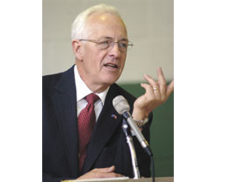Judge Kieser Speaks at Ecumenical Luncheon
From the October 8, 2009 Williamsport Sun-Gazette
Lycoming County Senior Judge William S. Kieser told those gathered for an ecumenical luncheon Wednesday his career on the bench didn't start out, but ended up, being all about the welfare of children.
"We must continue to look after the children," he said with a lump in his throat and tears welling as he spoke to the United Churches of Lycoming County Ecumenical lunch attendees at Pine Street United Methodist Church.
"We as a court system can deal with dependency issues, but it's a matter for the community to continue to step up," he said pointing out his dismay about the challenge facing The Center, 600 Campbell St., which may have to shut down youth-oriented programs because of severe financial hardship.
In his 17 years behind the bench, Kieser said the welfare of children has somehow come into play during the course of hearings, trials and heart-wrenching crimes such as when James Mitchell took a shotgun and blew away the mother of his children in 1996. That came after Kieser wrote a protection-from-abuse order requiring Mitchell to stay away from the ill-fated woman.
"I could not prevent it," he said, again breaking up.
Another youth case he noted was a young man in his 20s, Jonathan R. Mitchell III, who was convicted of first-degree murder in 2005 for a drug-related shooting and robbery at High and Hepburn streets.
"Unless you change the heart and thought, it doesn't matter how many judges, it is not going to change the nature of the type of people who come before us," he said, again with emotion.
"Both Mitchells were convicted of first-degree murder and neither received the death penalty ... I'm fine with that but mandatory sentencing is not going to change behavior."
Kieser also noted successes seen in the justice system, such as the case of a 4-year-old girl who was raped and abused by a male relative. Some 15 years later, Kieser said, the girl wrote him a letter telling the judge she was graduating from high school. Today, he said, the girl is on her own making a living.
Kieser also encouraged the churches in the community to look at where they put their resources and consider programs and efforts that focus on the continued welfare of children.
He praised efforts of Juvenile Probation and said the yearly caseload of 500 to 600 was once up to as high as 900 in the early 1990s. Efforts from Children and Youth Services, mentoring at First United Methodist Church, The Center and Big Brothers Big Sisters, to name a few, are having an impact and must continue to, he said.
In addition, teachers, probation officers and Court Appointed Special Advocate volunteers working through the YWCA and courts to be parental role models for dependent children are changing young lives, he said.
Kieser also lauded the legal community, claiming the attorneys here are among the brightest as well as the most community-minded.
He also marveled at the efforts of juries, who he said, for the most part, do their best to review the facts, delve through testimony, apply the law and come up with an answer that is right in their verdicts in the criminal justice system.
He said juries - despite being paid a measly $9 per day and 20 cents per mile, figures that have not changed since 1958, do their work.
"Today, that is a tremendous hardship for people who must provide food on the table and child care," Kieser said. "It is one of the things I am most disappointed in," he said of the lack of increase in fees paid to juries.
Kieser also paid homage to the arrival of treatment courts for drug and alcohol abuse, mental health and underage drinking.
"It should be recognized the courts are being asked to exercise societal (social) reworking," he said.
"Judges are limited in what we can do, and the courts are not real good on prevention, but do work on prevention occurrence," he said. "Yet, we're pleased to see their success."

